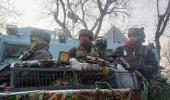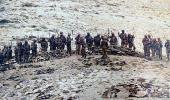Chief of Army Staff General Manoj Pande on Monday said transgressions remain the potential trigger for escalations along the Line of Actual Control (LAC) with China and asserted India has adequate reserves and was prepared to deal with any contingency.

He said China has accrued significant capacities for force mobilisation, application, and sustenance of military operations and maintained the long-pending boundary issue can not be divorced from bilateral relations between the two Asian giants.
General Pande said Chinese attempts to carry out transgressions across the LAC in violations of past agreements/protocols remain a matter of concern for India, but the Army's preparedness remains of a high order, comments coming in the backdrop of the border standoff in eastern Ladakh that started in May 2020.
He was speaking at the 2nd Strategic Dialogue on 'Rise of China and its Implications for the World', organised by the Savitribai Phule Pune University and the New Delhi-based Centre for China Analysis and Strategy.
"I think the most important aspect of our operational environment remains our legacy challenges of the unsettled and disputed borders. Pockets of dispute and contested claims to the territory continue to exist due to differing perceptions of the alignment of the Line of Actual Control. Transgressions remain the potential trigger for escalations," the Chief of Army Staff cautioned.
Hence, Sino-Indian border management requires close monitoring as infirmities can lead to a wider conflict, General Pande said.
"As we all knew we have agreements/protocols -- (signed in) 1993, 1996, 2005, and 2013 -- in the military domain to maintain peace and tranquillity on the LAC. Of concerns remain the violations of these by China -- with their attempt to carry out -- transgressions across the LAC," he said.
The decades-old boundary issue can not be divorced from bilateral relations, General Pande asserted and went on to quote External Affairs Minister S Jaishankar, who had said, "for (India-China) ties to return to the positive trajectory and remain sustainable - they must be based on three mutual sensitivity, respect, and interest."
New Delhi has repeatedly maintained that its ties with Beijing cannot be normal unless there is peace in the border areas.
General Pande said engagement mechanisms exist at political, diplomatic, and military levels between the two countries which are optimally utilized to ensure stability along the LAC.
Talks are continuing under these establishment mechanisms, he said.
"China has accrued significant capacities for force mobilization, application, and sustenance of military operations. It has built infrastructure of military significance -- be it roads, airfields, helipads, and so on," the Army chief added.
He said the Indian Army's strategic orientation and long-term capability development have been with a focus on the northern border.
"We have carried out the required rebalancing of the forces to affect the desired response on the northern border," General Pande said.
The Army chief insisted India has adequate reserves and was prepared to deal with any contingency.
"Our preparedness remains of a high order and troops continued to deal with PLA (China's People's Liberation Army) in a firm, resolute, and measured manner while ensuring the sanctity of our claims," he asserted.
General Pande stated that the Indian Army has ramped up its efforts to fructify the operationally critical logistical requirements, especially roads in the forward areas.
The Indian Army is working in synergy with all agencies in the forward areas to upgrade infrastructure, he added.










 © 2025
© 2025